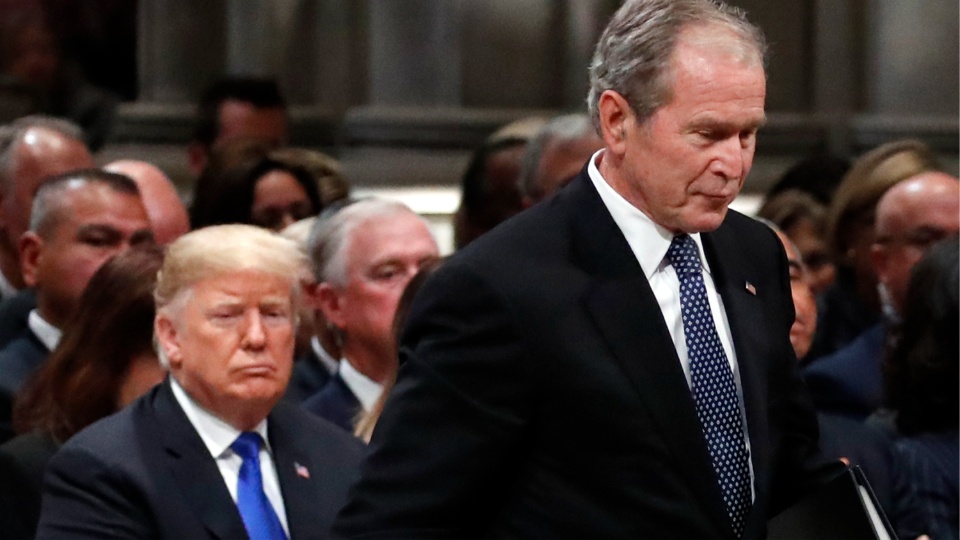
An older generation remembers President Richard Nixon desperately insisting, during the Watergate scandal, “I am not a crook.” Along the same lines, right-wing Supreme Court Justice Amy Coney Barrett implores, “This court is not comprised of a bunch of partisan hacks.”
If you have to say it, it’s too late.
The Supreme Court is under attack these days. A solid majority of Americans disapprove of the way the court is doing its job—and rightly so. Almost two out of three Americans believe the court is mainly motivated by politics.
And they’re right.
Once the most trusted of American institutions, the Supreme Court faces a crisis of legitimacy. Central to that crisis is the fact that three members of the Republican supermajority gained their seats through anti-constitutional duplicity.
Let’s go back to the year 2000 and the Bush versus Gore presidential contest.
The hyper-close election came down to Florida, where, at a key moment with a recount underway, Bush enjoyed a threadbare lead of 537 votes out of 5.8 million cast. Bush’s margin had been shrinking as the recount progressed, and progressives were hopeful it would disappear.
Enter the right-wing Supreme Court. In a startling 5-4 decision, the court halted the recount, handing the presidency to Bush.
The decision was roundly condemned by nearly 700 law professors of different political views, who warned: “By stopping the vote count in Florida, the U.S. Supreme Court used its power to act as political partisans, not judges of a court of law. By taking power from the voters, the Supreme Court has tarnished its own legitimacy.” (Disclosure: I drafted the statement!)
Why did the court perpetrate this judicial coup d’etat on behalf of a candidate who’d lost the national popular vote by over a half million ballots?
Because it was necessary to secure the succession. In 2000, the right-wing dominated the Supreme Court, but just barely. With two justices in their 70s, the five conservatives feared a Democratic president would be able to shift the balance to the liberal justices.
So, the conservatives installed an illegitimate president and in return received two illegitimate right-wing justices, John Roberts and Samuel Alito.
The right-wingers used their continued ascendancy to enact the GOP’s political agenda.
Defying long precedent, they invented a personal right to own firearms in the 5-4 D.C. v. Heller case, enabling a seemingly unstoppable epidemic of gun violence. In the 5-4 Citizens United decision, they emboldened corporations and the rich to corrupt our politics with floods of money. And in the 5-4 Shelby County case, they unleashed a war on democracy by crippling the Voting Rights Act.
Now add Justice Neil Gorsuch.
In February 2016, conservative Justice Antonin Scalia died. Under the Constitution, President Obama had the right and obligation to fill the vacancy—and the Senate had the duty to consider his nominee, Merrick Garland. Instead, the GOP-controlled Senate spurned its constitutional obligations, refusing to even hold a vote on Garland’s confirmation.
Over a year later, Donald Trump—another Republican president who took office after losing the popular vote—gained the presidency and appointed Gorsuch, who stole the seat that was Obama’s to fill under the Constitution.
If these three had not been placed on the court through chicanery, we’d have a liberal majority instead of a right-wing supermajority—and we’d see major differences in our lives.
We’d get better solutions to school shootings than putting bullet-proof backpacks on our children. The crushing burden of student loans would be lightened for millions. Our democracy would be less at risk, with voting rights protected and gerrymandering reined in.
Judges wouldn’t be undermining government action on the unfolding climate disaster. And women would still have the right to decide for themselves whether to bear children.
Americans are paying a harsh price for a Supreme Court without legitimacy. And how long can a court without legitimacy command our obedience?
Institute for Policy Studies / OtherWords












Comments